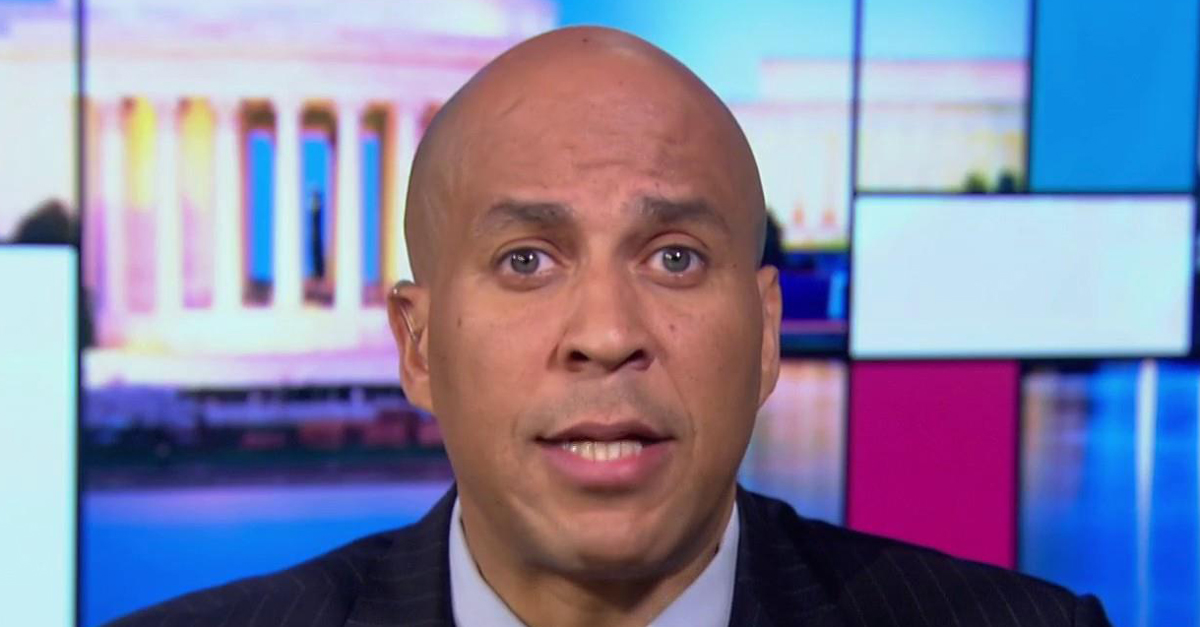Presidential Candidate Cory Booker Wants Marijuana Justice

Sen. Cory Booker (D-NJ) has the strongest cannabis credentials of all the contenders for the Democratic presidential nomination in 2020.
Senator Booker is the lead author of the Marijuana Justice Act (MJA), which he originally introduced in 2017 and reintroduced in February. Four other Democratic presidential candidates are co-sponsors – Senators Kirsten Gillibrand (D-NY), Kamala Harris (D-CA), Bernie Sanders (I-VT) and Elizabeth Warren (D-MA) – as well as Senators Michael Bennett (D-CO), Jeff Merkley (D-OR) and Ron Wyden (D-OR).
«The War on Drugs has not been a war on drugs, it’s been a war on people, and disproportionately people of color and low-income individuals,» Booker stated. «The Marijuana Justice Act seeks to reverse decades of this unfair, unjust, and failed policy by removing marijuana from the list of controlled substances and making it legal at the federal level.
«But it’s not enough to simply decriminalize marijuana. We must also repair the damage caused by reinvesting in those communities that have been most harmed by the War on Drugs. And we must expunge the records of those who have served their time. The end we seek is not just legalization, it’s justice.»
According to his office’s press release, the MJA would «reverse decades of failed drug policy that has disproportionately impacted low-income communities and communities of color. Beyond removing marijuana from the list of controlled substances – making it legal at the federal level – the bill would also automatically expunge the convictions of those who have served federal time for marijuana use and possession offenses, and it would reinvest in the communities most impacted by the failed War on Drugs through a community fund.”
It would also “incentivize states through the use of federal funds to change their marijuana laws if those laws were shown to have a disproportionate effect on low-income individuals and/or people of color.”
Personal Marijuana Use
“I’ve never smoked marijuana,” Booker told Vice in 2017. “I’ve never smoked a cigarette. I’ve never eaten marijuana. I’ve never tried another drug. I’ve never drank alcohol. This, to me, is not an issue I come at through my own experimentation. I come at this as an issue of justice.»
He’s criticized Harris and Sanders for making jokey remarks about having smoked pot when they were younger and has called out other politicians for laughing about having broken the criminal laws that they’ve written.
“The unequal application of marijuana laws has created a justice system where outcomes are often more dependent upon race and class than dependent upon guilt or innocence,” he said on the Senate floor in January. “In privileged communities and places all across this country, marijuana is being used with little fear of consequences and openly spoken about and joked about with little understanding of the painful fact that the War on Drugs in America has scarcely affected their lives but the War on Drugs, because of the unequal application of the laws, is affecting people in other communities.”
“I’ve never smoked marijuana. I’ve never smoked a cigarette. I’ve never eaten marijuana. I’ve never tried another drug. I’ve never drank alcohol. This, to me, is not an issue I come at through my own experimentation. I come at this as an issue of justice.»
Record on Capitol Hill
Booker was Mayor of Newark, NJ from 2006-2013 before he ran for the Senate and won in 2013. As a Senator, he has a solid history of support for criminal justice reform. In addition to the MJA, Booker signed on to the CARERS Act, which aimed to protect patients in states where medical marijuana is legal. He also co-sponsored the First Step Act, a sentencing reform measure that passed in December, called it “the beginning of a long effort to restore justice to our justice system.”
The Senator’s been a frequent and strong critic of the current administration’s drug-war policies and was one of the few members of the Judiciary Committee to raise concerns about the White House’s choice of James Carroll as the nation’s Drug Czar and voted against confirming him.
Booker also opposed the confirmation of Jeff Sessions as Attorney General, even taking the extraordinary step of testifying against Sessions’ nomination. He voted against confirming Sessions’ replacement William Barr and walked out of Brett Kavanaugh’s Supreme Court nomination hearing in protest, risking punishment by the Senate for discussing and releasing some of Kavanaugh’s emails.
Contributions from Financial Firms and Big Pharma
One of the biggest criticisms that Booker faces is that he’s a corporate Democrat beholden to big money. He’s received significant campaign contributions from the financial services industry, including Goldman Sachs and Morgan Stanley. In his 2018 Senate reelection campaign, Booker raised over $26 million, of which more than $5.8 million came from financial services, insurance and real estate sectors. Another $3.5 million was from lawyers and lobbyists. That’s a lot of money, which you’d expect would buy a lot of access and favors.
According to Open Secrets, «In 2016, pharmaceutical PACs gave $57,500 to Booker. Becton, Dickinson & Co, Bristol-Myers Squibb and Sanofi PACs all contributed $5,000 each in 2016. Before that, in 2014, a cycle he was actually running in, Booker’s campaign took in $161,000 in pharmaceutical PAC money. Pfizer contributed $17,500, Merck & Co gave $12,500 and several more gave $10,000 each.»
Whether or not Cory Booker gets the nomination, he’s helping push the Democrats into supporting reform by proving that legalization is a winning political issue, despite what frontrunner Joe Biden thinks.
RELATED
The Marijuana Justice Act Is the New NORML
Joy Inside My Tears: The Greening of Kamala Harris
An Apology from Joe Biden for His Drug-War Sins Would Be Nice
If you enjoyed this Freedom Leaf article, subscribe to the magazine here

